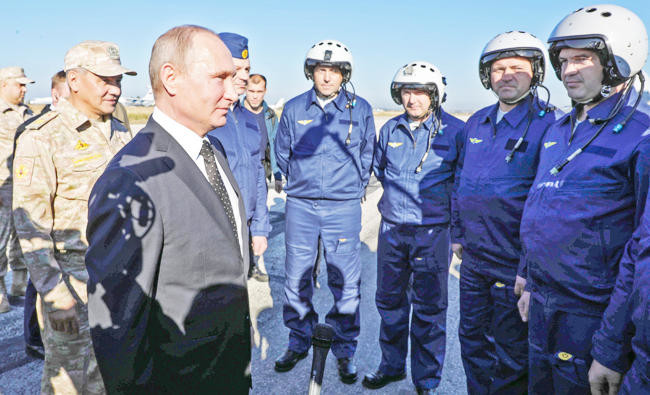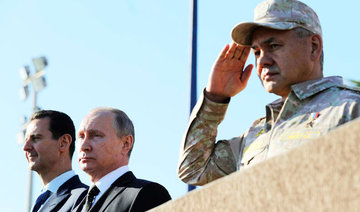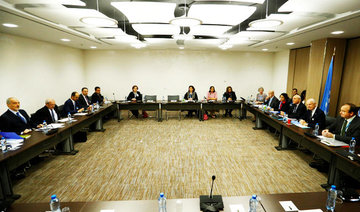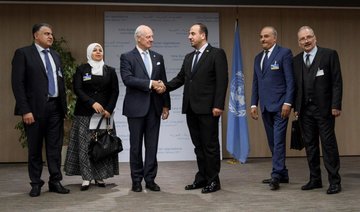JEDDAH: Russian President Vladimir Putin declared victory in Syria on Monday during a surprise visit to a Russian military base in the country and announced a partial pullout of his troops.
It was Putin’s first trip to Syria, where Russia launched an air campaign in 2015 that allowed the Bashar Assad regime to gain the upper hand against the Syrian opposition. It was also the first visit by a foreign head of state to Syria since the anti-regime protests began in 2011.
Putin ordered “a significant part” of Russia’s military contingent in Syria to start withdrawing on Monday, saying Moscow and Damascus had achieved their mission of defeating Daesh in just over two years.
He made the announcement during a visit to Hmeymim air base in Syria, where he held talks with Assad and addressed Russian forces.
Putin told Russian servicemen they would return home as victors. “The task of fighting armed bandits here in Syria, a task that was essential to solve with the help of extensive use of armed force, has for the most part been solved, and solved spectacularly,” he said. “I salute you.”
He said his military had proved its might, Moscow had succeeded in keeping Syria intact as a “sovereign independent state,” and conditions had been created for a political solution.
He said while Russia might be drawing down much of its forces, its military presence in Syria is permanent and will retain enough firepower to destroy any Daesh comeback.
Russia will keep its Hmeymim air base in Latakia province and its naval facility in the Mediterranean port of Tartous “on a permanent basis,” said Putin. Both bases are protected by sophisticated air defense missile systems.
Hamdan Al-Shehri, a political analyst and international relations scholar, said one should not ready much into Putin’s announcement.
“This isn’t a withdrawal, this will simply be a relocation of troops. All Russians troops will be at Hmeymim air base and its naval facility in Tartous,” he told Arab News.
This “maneuvering” stems from the fact that there is no longer an excuse for Russia to stay in Syria because Daesh is finished there and in Iraq, he said, adding: “There’s no pretext anymore to justify the Russian presence in Syria.”
Russia may have accomplished what it wanted to militarily, “but for the people of Syria there’s no light at the end of a very dark tunnel,” Al-Shehri said. “They want to see the end of Assad, the man whose regime spilled the blood of nearly 500,000 fellow Syrians.”
Al-Shehri said Russia should focus on meeting the aspirations of the Syrian people. “It sided with the tyrant, not the people of Syria,” he said. “Now is the time for Russia to hammer out a solution where there’s no room for a killer like Assad.”
Oubai Shahbandar, a Syrian-American analyst and fellow at the New America Foundation’s International Security Program, told Arab News that Russia has long-term basing agreements with the Assad regime, “so as long as Assad is in power, Russian forces will remain to prop him up.”
On Putin’s “mission accomplished” speech in Hmeymim, Shahbandar said: “The manner in which he summoned Assad was clearly indicative of who holds the dominant position in that partnership. The prospect of the Russians withdrawing in total seems unlikely at this juncture.”
Pentagon spokesman Maj. Adrian Rankine-Galloway said: “Russian comments about removal of their forces do not often correspond with actual troop reductions, and do not affect US priorities in Syria.”
An American official told Agence France-Presse that Putin is likely to carry out a “token withdrawal” of some aircraft, then follow up by demanding that the US pull its forces out of Syria.
EU diplomatic chief Federica Mogherini said the bloc is ready to do whatever is needed to support UN-brokered peace efforts, but warned that the idea that “things can go back to normal unfortunately has no real ground.”
She added: “Conflict is still ongoing, even if some wish to pretend it is over. We know very well that on the ground fighting is still going on, civilians are still attacked, and we see that with our humanitarian support every single day inside Syria.”
Putin orders partial withdrawal of Russian troops from Syria
Putin orders partial withdrawal of Russian troops from Syria

EU medical aid crosses into Syria from Turkiye

official said.
Part of an EU air bridge to Syria, the supplies crossed Turkiye’s southern Cilvegozu border post and were taken to a warehouse in the northwestern city of Idlib, Mrinalini Santhanam of the World Health Organization said.
“There’s one more air bridge, and it is planned for February,” she said, adding that it was “still in the planning stages” with talks “to determine the volume and the scale.”
The supplies, distributed to Idlib and the Aleppo region health care centers, are
part of an EU humanitarian bridge announced by Brussels on Dec. 13.
The aim is to support Syria’s battered healthcare system following the ouster of Bashar Assad on Dec. 8.
Included in the shipment were 8,000 emergency surgical kits, anesthetic supplies, IV fluids, sterilization materials, and medications to prevent disease outbreaks, the WHO said.
The civil war, which broke out in 2011, devastated Syria’s health care system, with “almost half of the hospitals (there) not functional,” WHO planning analyst Lorenzo Dal Monte said in late December.
He said the 50-tonne shipment from Dubai included “mainly trauma and surgical kits.”
Another five tonnes of supplies were brought in from another stockpile in Demark, including emergency health kits as well as winter clothing and water purification tablets, the WHO said.
US, French troops could secure Syria’s northern border, Syrian Kurdish official says

- Turkiye regards the YPG, which spearheads the US-allied Syrian Democratic Forces (SDF), as a terrorist group linked to Kurdish PKK militants
- Ilham Ahmed: ‘We ask the French to send troops to this border to secure the demilitarised zone, to help us protect the region and establish good relations with Turkiye’
PARIS: Talks are taking place on whether US and French troops could secure a border zone in northern Syria as part of efforts to defuse conflict between Turkiye and Western-backed Kurdish Syrian forces, a senior Syrian Kurdish official said.
Ankara has warned that it will carry out a cross-border offensive into northeastern Syria against the Kurdish YPG militia if the group does not meet Turkish demands.
Turkiye regards the YPG, which spearheads the US-allied Syrian Democratic Forces (SDF), as a terrorist group linked to Kurdish PKK militants who for 40 years have waged an insurgency against the Turkish state.
The SDF played an important role in defeating Daesh in Syria in 2014-17. The group still guards Daesh fighters in prison camps there, but has been on the back foot since rebels ousted Syrian President Bashar Assad on Dec. 8.
French President Emmanuel Macron said earlier this week that Paris would not abandon the SDF, which was one among a myriad of opposition forces during Syria’s 13-year-long civil war.
“The United States and France could indeed secure the entire border. We are ready for this military coalition to assume this responsibility,” Ilham Ahmed, co-chair of foreign affairs for the Kurdish administration in northern territory outside central Syrian government control, was quoted as saying by TV5 Monde.
“We ask the French to send troops to this border to secure the demilitarised zone, to help us protect the region and establish good relations with Turkiye.”
Neither France nor Turkiye’s foreign ministries immediately responded to requests for comment. The US State Department was not immediately available for comment.
It is unclear how receptive Turkiye would be to such an initiative, given Ankara has worked for years to secure its border against threats coming from Syria, and has vowed to destroy the YPG.
“As soon as France has convinced Turkiye to accept its presence on the border, then we can start the peace process,” Ahmed said. “We hope that everything will be settled in the coming weeks.”
A source familiar with the matter said such talks were going on, but declined to say how advanced or realistic they were.
Washington has been brokering ceasefire efforts between Turkish-backed groups and the SDF after fighting that broke out as rebel groups advanced on Damascus and overthrew Assad.
Addressing a news conference in Paris alongside outgoing US Secretary of State Antony Blinken, French Foreign Minister Jean-Noel Barrot hinted that there were talks on the issue.
“The Syrian Kurds must find their place in this political transition. We owe it to them because they were our brothers in arms against Islamic State,” Barrot said.
“We will continue our efforts ... to ensure that Turkiye’s legitimate security concerns can be guaranteed, but also the security interests of (Syria’s) Kurds and their full rights to take part in the construction in the future of their country.”
Blinken said it was vital to ensure that the SDF forces continued the job of guarding more than 10,000 detained Daesh militants as this was a legitimate security interest for both the US and Turkiye.
“We have been working very closely with our ally ... Turkiye to navigate this transition ... It’s a process that will take some time,” Blinken said.
The US has about 2,000 troops in Syria who have been working with the SDF to prevent a resurgence of Daesh.
A French official said France still has dozens of special forces on the ground dating from its earlier support of the SDF, when Paris provided weapons and training.
Macron to head to Lebanon after election of new president

- France “will continue to be at the side of Lebanon and its people,” Macron told Aoun in a telephone call
- France administered Lebanon for two decades after World War I and has maintained close ties even since its independence in 1944
PARIS: French President Emmanuel Macron on Thursday welcomed the “crucial election” by Lebanese lawmakers of army chief Joseph Aoun as president and said he would soon visit the country.
Macron spoke with the general hours after Aoun was announced as the leader to end a two-year vacuum in the country’s top post.
France “will continue to be at the side of Lebanon and its people,” Macron told Aoun in a telephone call, the French presidency said in a statement. Macron said he would go to Lebanon “very soon.”
“Congratulations to President Joseph Aoun on this crucial election,” Macron wrote on X earlier.
“It paves the way for reform and the restoration of Lebanon’s sovereignty and prosperity,” he added.
Aoun must oversee a ceasefire in south Lebanon and name a prime minister able to lead reforms demanded by international creditors to save the country from a severe economic crisis.
“The head of state indicated to President Aoun that France would support his efforts to quickly complete the formation of a government capable of uniting the Lebanese, answering their aspirations and their needs, and carrying out the reforms necessary for the economic recovery, reconstruction, security and sovereignty of Lebanon,” said the statement released after the telephone talks.
Macron also vowed support for the “national dialogue” that Aoun said he will launch and called on all groups to “contribute to the success of his mission,” the statement said.
France administered Lebanon for two decades after World War I and has maintained close ties even since its independence in 1944.
Israel rallies global support to win release of a woman believed kidnapped in Iraq

- The official said Thursday that the matter was raised in a meeting of special envoys for hostage affairs in Jerusalem this week
- Israel and Iraq do not have diplomatic relations
JERUSALEM: A senior Israeli official says the government is working with allies in a renewed push to win the freedom of an Israeli-Russian researcher who is believed to have been kidnapped in Iraq nearly two years ago.
The official said Thursday that the matter was raised in a meeting of special envoys for hostage affairs in Jerusalem this week.
He said the envoys met the family of Elizabeth Tsurkov and that Israel asked the representatives – from the US, UK, Germany, Austria and Canada – to have their embassies in Baghdad lobby the Iraqi government and search for a way to start negotiations. Israel and Iraq do not have diplomatic relations. He said he hopes other countries will help.
“We are counting on our allies,” the official said, speaking on condition of anonymity because he was discussing closed-door discussions. “And I hope that other nations will suggest assistance in helping us release Elizabeth. Many nations have embassies and contacts with the Iraqi government.”
Tsurkov, a 38-year-old student at Princeton University, disappeared in Baghdad in March 2023 while doing research for her doctorate. She had entered the country on her Russian passport. The only sign she was alive has been a video broadcast in November 2023 on an Iraqi television station and circulated on pro-Iranian social media purporting to show her.
No group has claimed responsibility for the kidnapping. But Israel believes she is being held by Kataib Hezbollah, an Iranian-backed Iraqi militia that it says also has ties to the Iraqi government.
The Israeli official said that after months of covert efforts, Israel believes the “changes in the region” have created an opportunity to work publicly for her release.
During 15 months of war, Israel has struck Iran and its allies, and Iran’s regional influence has diminished. Iraq also appears to have pressured militia groups into halting their aerial attacks against Israel.
Gaza war deaths pass 46,000

- The ministry said a total of 46,006 Palestinians have been killed and 109,378 wounded
- The Israeli military says it has killed over 17,000 militants
GAZA: Gaza’s Health Ministry said Thursday that more than 46,000 Palestinians have been killed in the Israel-Hamas war, with no end in sight to the 15-month conflict.
The ministry said a total of 46,006 Palestinians have been killed and 109,378 wounded. It has said women and children make up more than half the fatalities, but does not say how many of the dead were fighters or civilians.
The Israeli military says it has killed over 17,000 militants, without providing evidence. It blames Hamas for their deaths because it says the militants operate in residential areas.
Hundreds of thousands of Palestinians are now packed into sprawling tent camps along the coast with limited access to food and other essentials. Israel has also repeatedly struck what it claims are militants hiding in shelters and hospitals, often killing women and children.
The war began when Hamas-led militants stormed into southern Israel on Oct. 7, 2023, killing some 1,200 people and abducting around 250. A third of the 100 hostages still held in Gaza are believed to be dead.




















